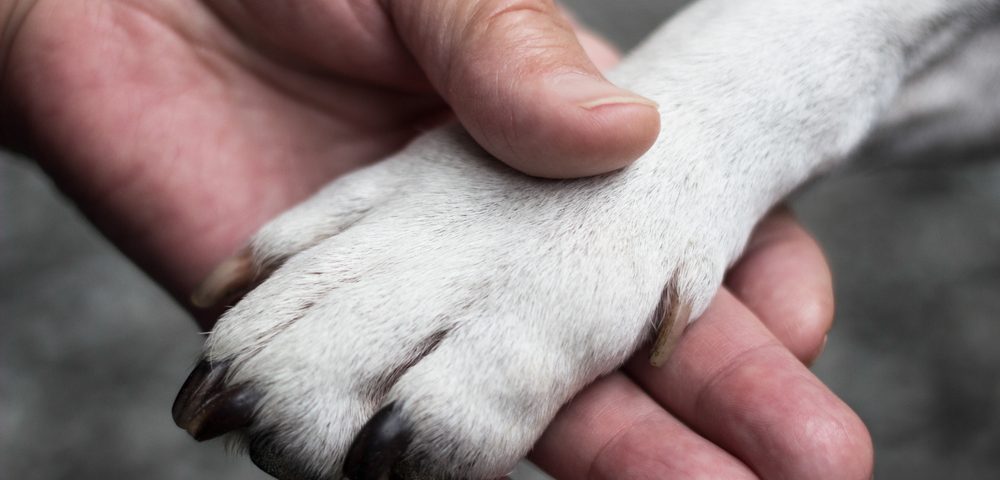The Secret Life of Sasha and How She Saved Me
Written by |

Have you ever walked in the door and immediately been greeted by your fur baby? If so, you know how good it feels to have been missed — even if you’re greeted with sloppy kisses and a hyperactive bouncy dog. Mine often gets twisted up in my oxygen tubing as I attempt to get inside the house.
Living with a chronic illness like pulmonary hypertension (PH) is isolating at times. My husband and I are empty-nesters. So, while he’s at work, Sasha keeps me company. Sasha, our mini schnauzer, is our fur baby.
As a child, we had pets, mainly dogs, but none I was very attached to. About 12 years ago, my husband wanted a mini schnauzer. We looked at puppies, searching for “the one.” One weekend we finally found him: the only salt and pepper one left.
He was so tiny, and he reminded me of Bambi when he got up to walk — so unsteady on his small legs. We brought him home and named him Hurley. He slept in a baby blanket on my lap the entire 45-minute drive home. Sadly, Hurley went missing a few years later. Gardeners were at our house that day, and we think they could have left the gate open.
After waiting a few years, we decided to look for another mini schnauzer. This time, we wanted to find one that was over the puppy stage. Sasha, as we named her, was almost 4. She’s all black and loves to take naps — more often than I do, hehe.
She always senses when I’m not feeling up to par. She wants to be close to me and cuddle more. She certainly helps me on days when I’m struggling with PH. Once, when I stumbled and fell into the back door, I awoke to puppy kisses on my face. The doctors think I experienced a fainting episode, and we are all grateful that Sasha saved me. All I could manage to do afterward was crawl to my phone.
Not only can pets sense our mood and emotions, but they impact our mental health. For those of us with chronic illnesses, a fur baby can serve as much more than a trusted companion. Some depend on service animals. These animals are specially trained to assist their owners with their disabilities. These trained pets may act as someone’s eyes or ears and protect them. Others help with mental illnesses like post-traumatic stress disorder.
Pet therapy is often utilized in long-term care settings. Hospitals, especially children’s hospitals, use this type of therapy. When I was a nurse, I would go to long-term care facilities that had cats or even dogs. The patients’ faces would light up as the pets came around.
Returning home from hospitalizations, Sasha is waiting and excited as I walk in the door. Heck, at times, Sasha is crying and goes wild. I start to think she misses me the most! She offers unconditional love, even when I haven’t showered for days. Pulmonary hypertension can wreak havoc on our mental psyche. Some days cuddling on the couch with Sasha is the only thing I need to do. And some days, I am OK with doing just that.
Do you have a service animal or fur baby? How are they impacting your life? Share below in the comments.
***
Note: Pulmonary Hypertension News is strictly a news and information website about the disease. It does not provide medical advice, diagnosis, or treatment. This content is not intended to be a substitute for professional medical advice, diagnosis, or treatment. Always seek the advice of your physician or other qualified health provider with any questions you may have regarding a medical condition. Never disregard professional medical advice or delay in seeking it because of something you have read on this website. The opinions expressed in this column are not those of Pulmonary Hypertension News or its parent company, Bionews Services, and are intended to spark discussion about issues pertaining to pulmonary hypertension.







HardyPet
Hi Jen Cueva. I understand you perfectly. I myself live with a chronic illness. There is a feeling that only your pet understands you in this world. And it's not surprising, because there is animal assisted therapy.
For example dolphin therapy and hippo-therapy.
And you are very lucky that your pet saved your life.
Love your pet with all your heart, he is a part of this world for you, and you are the whole world for him.
Jen Cueva
Thanks for reading my column. I am happy that you could relate in some ways. My Sasha is certainly aware when I do not feel my best.
Kindly,
Jen